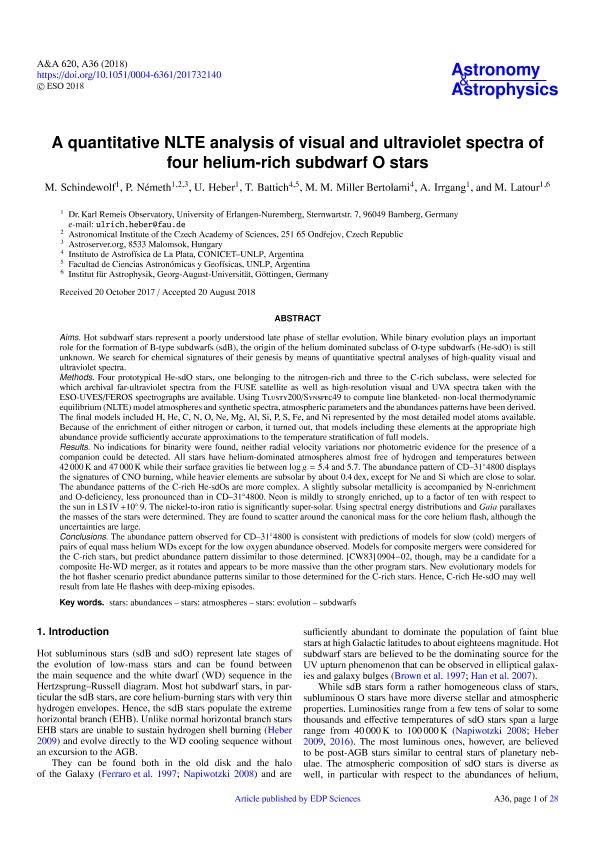Artículo
A quantitative NLTE analysis of visual and ultraviolet spectra of four helium-rich subdwarf O stars
Schindewolf, M.; Németh, P.; Heber, U.; Battich, Tiara ; Miller Bertolami, Marcelo Miguel
; Miller Bertolami, Marcelo Miguel ; Irrgang, A.; Latour, M.
; Irrgang, A.; Latour, M.
 ; Miller Bertolami, Marcelo Miguel
; Miller Bertolami, Marcelo Miguel ; Irrgang, A.; Latour, M.
; Irrgang, A.; Latour, M.
Fecha de publicación:
12/2018
Editorial:
EDP Sciences
Revista:
Astronomy and Astrophysics
ISSN:
0004-6361
Idioma:
Inglés
Tipo de recurso:
Artículo publicado
Clasificación temática:
Resumen
Aims. Hot subdwarf stars represent a poorly understood late phase of stellar evolution. While binary evolution plays an important role for the formation of B-Type subdwarfs (sdB), the origin of the helium dominated subclass of O-Type subdwarfs (He-sdO) is still unknown. We search for chemical signatures of their genesis by means of quantitative spectral analyses of high-quality visual and ultraviolet spectra. Methods. Four prototypical He-sdO stars, one belonging to the nitrogen-rich and three to the C-rich subclass, were selected for which archival far-ultraviolet spectra from the FUSE satellite as well as high-resolution visual and UVA spectra taken with the ESO-UVES/FEROS spectrographs are available. Using Ta LUSTY200/Sa YNSPEC49 to compute line blanketed-non-local thermodynamic equilibrium (NLTE) model atmospheres and synthetic spectra, atmospheric parameters and the abundances patterns have been derived. The final models included H, He, C, N, O, Ne, Mg, Al, Si, P, S, Fe, and Ni represented by the most detailed model atoms available. Because of the enrichment of either nitrogen or carbon, it turned out, that models including these elements at the appropriate high abundance provide sufficiently accurate approximations to the temperature stratification of full models. Results. No indications for binarity were found, neither radial velocity variations nor photometric evidence for the presence of a companion could be detected. All stars have helium-dominated atmospheres almost free of hydrogen and temperatures between 42 000 K and 47 000 K while their surface gravities lie between log g = 5.4 and 5.7. The abundance pattern of CD-31°4800 displays the signatures of CNO burning, while heavier elements are subsolar by about 0.4 dex, except for Ne and Si which are close to solar. The abundance patterns of the C-rich He-sdOs are more complex. A slightly subsolar metallicity is accompanied by N-enrichment and O-deficiency, less pronounced than in CD-31°4800. Neon is mildly to strongly enriched, up to a factor of ten with respect to the sun in LS IV +10° 9. The nickel-To-iron ratio is significantly super-solar. Using spectral energy distributions and Gaia parallaxes the masses of the stars were determined. They are found to scatter around the canonical mass for the core helium flash, although the uncertainties are large. Conclusions. The abundance pattern observed for CD-31°4800 is consistent with predictions of models for slow (cold) mergers of pairs of equal mass helium WDs except for the low oxygen abundance observed. Models for composite mergers were considered for the C-rich stars, but predict abundance pattern dissimilar to those determined. [CW83] 0904-02, though, may be a candidate for a composite He-WD merger, as it rotates and appears to be more massive than the other program stars. New evolutionary models for the hot flasher scenario predict abundance patterns similar to those determined for the C-rich stars. Hence, C-rich He-sdO may well result from late He flashes with deep-mixing episodes.
Palabras clave:
Stars: Abundances
,
Stars: Atmospheres
,
Stars: Evolution
,
Subdwarfs
Archivos asociados
Licencia
Identificadores
Colecciones
Articulos(IALP)
Articulos de INST.DE ASTROFISICA LA PLATA
Articulos de INST.DE ASTROFISICA LA PLATA
Citación
Schindewolf, M.; Németh, P.; Heber, U.; Battich, Tiara; Miller Bertolami, Marcelo Miguel; et al.; A quantitative NLTE analysis of visual and ultraviolet spectra of four helium-rich subdwarf O stars; EDP Sciences; Astronomy and Astrophysics; 620; A36; 12-2018; 1-32
Compartir
Altmétricas



